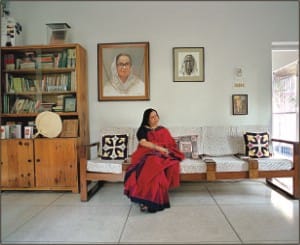“Naristan”: Drawing inspiration from “Sultana's Dream”

A photograph by Arabella Plouviez at the exhibition
“Now that they are accustomed to the purdah system and have ceased to grumble at their seclusion, we call the system 'murdana' instead of 'zenana'.” -- Sultana's Dream.
Begum Rokeya Sakhawat Hossain wrote the short story Sultana's Dream in 1905. The story was originally published in The Indian Ladies Magazine, Madras, India in English. Sultana's Dream is a witty story that presented an idea that must have been considered 'revolutionary' or 'outrageous' when it was published. It is a story about a utopia, 'Naristan', where all women are free within the public arena and men are kept in seclusion. It is a non-violent country, thriving on women's ability to combine knowledge from the arts and science.
For Begum Rokeya, the idea of 'female empowerment' must not have been alien. She was after all a pioneering Bengali feminist, writer, social reformer and progressive thinker. She wrote extensively, arguing for the education of women and set up a school for Muslim girls. She also founded the Bengali Muslim Women's Association.
Homage to this icon is rather fitting on the occasion of International Women's Day. Drik and British Council in association with IPRN and University of Sunderland have organised a photography exhibition titled “Naristan” at the Drik Gallery in Dhanmondi. The exhibition, starting from March 8, features photographs of women from varied backgrounds by Arabella Plouviez.
Plouviz has photographed women who are renowned like Hamida Hossain, as well as everyday housewives. None of the captions include the name of the subject but quotes from Sultana's Dream.
The subjects are all in their homes, either relaxing in the lounge, or contemplating in the bedroom.
The accompanying caption of a photo featuring the late poet Sufia Kamal's portraits and her daughter Sayeda Kamal reads, “This is Naristan, free from sin and harm. Virtue herself reigns here.”
An image featuring Shaheed Dr. Milan's widow shows a modest room with bare essentials. The caption reads, “All present solemnly vowed that they would never allow themselves to be enslaved, no matter what happened.”
Arabella Plouviez is the Head of Photography at the University of Sunderland. Her work involves image and text to visualise ideas and issues often researched through working with different groups of people. These include subjects like women prisoners in a high security prison, the representation of women in Northern England, image text work on drug users and HIV/AIDS, the communities along the rural coastal areas of North East England, a recent commission in Bangladesh and research into imagery of 'mad & bad' women.
Arabella has, with colleagues, been instrumental in setting up a photography research centre at the University of Sunderland, including the International Photography Research Network (IPRN), which received major EU funding for photographic commissioning along with partners in Slovakia, the Netherlands, Germany and Finland.
Her work has been exhibited nationally and internationally both within formal gallery spaces and in less conventional environments.
“Naristan”, with its limited number of photographs, may come across as 'vague' to the layman, uninformed viewer. But provided with the photographer's note and captions, this exhibition is rather inspiring.
The exhibition ends on March 17.

 For all latest news, follow The Daily Star's Google News channel.
For all latest news, follow The Daily Star's Google News channel. 



Comments